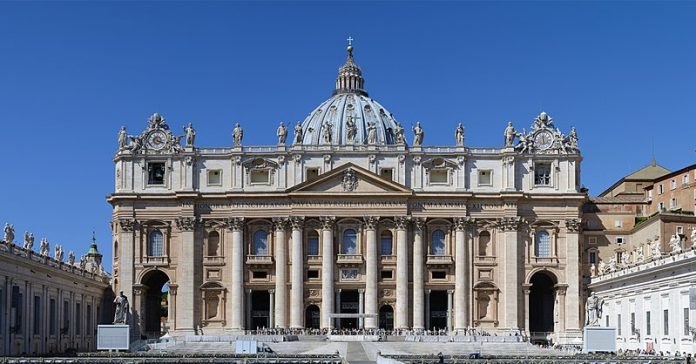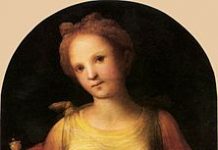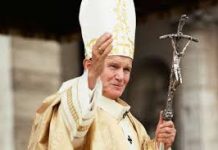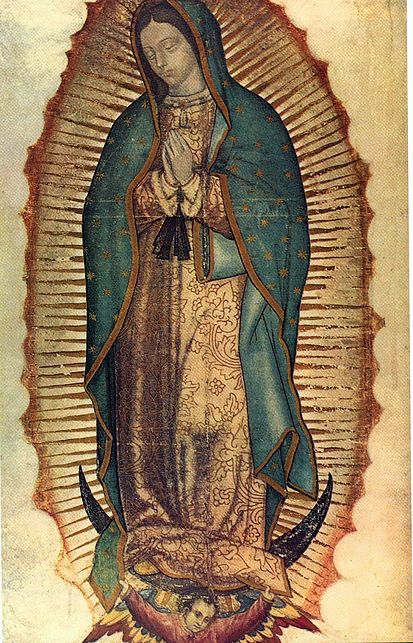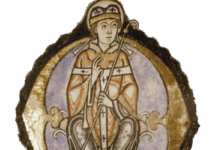Today in the New Rite is the Feast of the Chair of Saint Peter at Rome, celebrated in the Old Rite as the Feast of the Chair of Saint Peter at Antioch (the Old Rite celebrates the Feast of the Chair of Saint Peter at Rome on January 18), and in the spirit of this day I wish to look at a certain error which the well-known biblical scholar Bill Mounce made on his website. On said website, Mounce gives the definition of the Koine Greek adjective πρῶτος, -η, -ον (transliterated: protos, -e, -on),[1] noting first the general meaning of the word, which is “first.”[2] Expanding upon this general definition, Mounce notes that there are two specific ways to define πρῶτος, -η, -ον: “first (chronologically or in order of importance).”[3] Mounce then proceeds to list examples from the Bible for both meanings of πρῶτος, -η, -ον.[4]
The error which Mounce makes is found where he lists Matthew 10:2 as an example of πρῶτος, -η, -ον meaning “first (chronologically)”: “first, in time, order, etc., Mt. 10:2; 26:17.”[5] Matthew 10:2 is a verse in the Bible which lists the names of the Apostles, and reads as follows in the Koine Greek: “Τῶν δὲ δώδεκα ἀποστόλων τὰ ὀνόματά ἐστιν ταῦτα: πρῶτος Σίμων ὁ λεγόμενος Πέτρος καὶ Ἀνδρέας ὁ ἀδελφὸς αὐτοῦ.”[6] In English, Matthew 10:2 reads as follows: “And the names of the twelve apostles are these: The first, Simon who is called Peter, and Andrew his brother.”[7] Hence, what Mounce is saying is that the use of πρῶτος in reference to Saint Peter in Matthew 10:2 means “first (chronologically),” and not “first (in order of importance).”
However, Mounce has clearly made an error by saying that the use of πρῶτος in Matthew 10:2 is not an instance of the meaning “first (in order of importance),” and this becomes evident when one looks at the rest of the Bible. For in the Gospels, Saint Peter is either portrayed as being called by Christ simultaneously with Saint Peter’s brother Saint Andrew,[8] or is portrayed as being called by Christ simultaneously with Saint Andrew and the other Apostles,[9] or is portrayed as being called by Christ after Christ calls Saint Andrew, since Saint Andew in John’s Gospel is chronologically called by Christ first, and then Saint Andrew goes to find his brother Saint Peter, finds him successfully, and leads him to Jesus, and then Jesus calls Saint Peter, but only after Jesus calls Saint Andrew.[10] Hence, it is clear that Saint Peter is not called first chronologically, and therefore πρῶτος in Matthew 10:2 cannot mean “first (chronologically).”
This leaves only one option: πρῶτος in Matthew 10:2 must mean “first (in order of importance),” and the rest of the Bible is in agreement on this point. Saint Peter is always portrayed as the principal actor,[11] as well as the principal speaker,[12] especially in his profession of Faith in Jesus Christ’s Divinity found in Matthew’s Gospel.[13] Moreover, Saint Peter is singled out by name when he is mentioned with the other Apostles,[14] Saint Peter’s word at the Council of Jerusalem is the final word, which shows that Saint Peter’s word was more important than the word of any other Apostle, including that of Saint Paul,[15] and finally, for the protection of the Faith of the Apostles, Jesus prays only for Saint Peter’s Faith to survive, so that the survival of Saint Peter’s Faith will strengthen the Faith of the other Apostles, making the Faith of the Apostles dependent upon the Faith of Saint Peter.[16] Hence, it is clear from the rest of the Bible that Saint Peter is more important than any other Apostle, and thus the Bible clearly teaches that πρῶτος in Matthew 10:2 must mean “first (in order of importance).”
In the face of such overwhelming biblical testimony for the primacy of Saint Peter among the Apostles, one begins to wonder about the nature of Mounce’s error: Was it done in invincible ignorance? Or was it done from culpable ignorance? If Mounce were a layman untrained in biblical theology who did not know Koine Greek, one could give Mounce the benefit of the doubt and assume that acted in invincible ignorance. However, when one examines his website, one sees various things which prove that Mounce indeed possesses sufficient training in biblical theology and enough knowledge of Koine Greek to know everything which I have just presented in this article, including once being a professor of the New Testament and being the author of a well-known Koine Greek textbook.[17] Hence, it is logical to conclude that Mounce acted at least from culpable ignorance because — given his advanced training in biblical theology and in Koine Greek — Mounce should have known better. Worse yet, Mounce could have cited on his website the use of πρῶτος in Matthew 10:2 as an instance of πρῶτος meaning “first (chronologically)” fully knowing that the rest of the Bible demonstrates that πρῶτος cannot and does not mean “first (chronologically),” but rather means “first (in order of importance).”
Given the nature of Mounce’s error, one wonders what his motive might be if there is any. If Mounce did indeed know that the rest of the Bible makes clear that πρῶτος in Matthew 10:2 does not mean “first (chronologically)” but rather means “first (in order of importance)” — which is a very real possibility, since he should have known better for the reasons which I stated above — and given that Mounce is a Protestant because he served as a pastor,[18] then the reason that he would purposefully cite the use of πρῶτος in Matthew 10:2 as an instance of πρῶτος meaning “first (chronologically)” is because Mounce knows his Koine Greek Bible; he knows that Saint Peter possessed a primacy which the other Apostles did not possess. Further, Mounce also knows that history testifies to the fact that all the patriarchs of Rome trace their papal authority back to Saint Peter. Therefore, Mounce knows that the popes stand because they rest on the very person of Saint Peter, just as Saint Peter’s Basilica stands because it rests on the very tomb of Saint Peter, as the Scavi excavations between 1940 and 1949 revealed to the world. In other words, Mounce knows that the biblical basis for Saint Peter’s Primacy makes the Catholic Doctrine of Papal Primacy true, and that if he admits the truth of the former, then he must admit the truth of the latter. Hence why Mounce asserts that πρῶτος in Matthew 10:2 means “first (chronologically)” and not “first (in order of importance).”
Now, how does this all relate to Saint Joseph? How is this article “a Josephological apology for the papacy” as the title of this article says? The English word “apology” comes from the Ancient Greek word ἀπολογία (transliterated: apologia) which means “speaking in defense; a defence.” Hence, in writing this article, I am “speaking in defence” of the Catholic Doctrine of Papal Primacy to defend its legitimacy from attacks such as the one orchestrated by Mounce on his website.
Further, Saint Joseph was proclaimed by Blessed Pope Pius IX to be the Patron of the Universal Church,[19] which means that Saint Joseph is the defender of the unity of the Catholic Church. Furthermore, the pope is the principle of the unity of the entire Catholic Church because he is the successor of Saint Peter, who also was the principle of the unity of the entire Catholic Church when he was alive.[20] This is why Jesus renames Simon as “Peter”; for “Peter” is the English translation of the Ancient Greek name for Saint Peter, i.e., “Πέτρος” (transliterated: Petros) which means “rock, stone” because it is the masculine form of the Ancient Greek word for “rock, stone” i.e., πέτρα (transliterated: petra). Thus, Jesus in Matthew 16:18 is saying that Saint Peter is the principle of unity for the Catholic Church because Jesus is portraying Saint Peter in his very name as the foundation stone upon which the entire unity of the structure of the Catholic Church depends,[21] and such is true for Saint Peter’s successors.
Therefore, since the pope is the principle of the unity of the Catholic Church, and since Saint Joseph is the defender of the unity of the Catholic Church, then the primary way that Saint Joseph defends the unity of the Catholic Church is by defending the pope from attack. History has testified to the truth of what I propose here, since the enemies of the Church in 1870 ceased their attacks both on the Church and on Pope Pius IX once Saint Joseph was proclaimed Patron of the Universal Church by said pope, leading not only to the cessation of those attacks, but also causing reverence for the Catholic Church and for Pope Pius IX.[22] Ergo, in an age in which the pope is constantly assailed by objections such as those made by Mounce, prayer to Saint Joseph by invoking him under the titles of Patron of the Universal Church and Image of God the Father[23] is necessary. If faithful Catholics pray to Saint Joseph for the successor of Saint Peter under these two aspects of Saint Joseph’s patronage, then not only will the Catholic Church remain unified, but it will also spread its dominion over the whole world, making the Age of Peace — prophesied both in private revelations such as Our Lady of La Salette[24] and the prophecy of Isidore of Isolanis[25] and in Public Revelation through the Bible[26] — a reality. (*)
[1] Bill Mounce: For an Informed Love of God (website), under “πρῶτος,” accessed February 7, 2025, https://www.billmounce.com/greek-dictionary/protos.
[2] Ibid.
[3] Ibid.
[4] Ibid: “first, in time, order, etc., Mt. 10:2; 26:17; first in dignity, importance, etc., chief, principal, most important, Mk. 6:21; Lk. 19:47; Acts 13:50; 16:12.”
[5] Ibid., emphasis in bold is mine.
[6] Matthew 10:2 (Koine Greek), emphasis in bold is mine.
[7] Matthew 10:2 (Douay-Rheims), emphasis in bold is mine.
[8] Matthew 4:18-22; Mark 1:16-20.
[9] Luke 5:1-11.
[10] John 1:35-42.
[11] Acts 1:13-26; Acts 2:14-41; 3:6-7; 5:1-11; 9:36-41; 10:1-48.
[12] Matthew 19:27; Mark 8:27-29; Luke 9:18-20; 12:41; John 6:68-70; Acts 2:14.
[13] Matthew 16:13-20.
[14] Mark 16:7; Luke 9:32; Acts 2:37.
[15] Acts 15, especially verses 6-12.
[16] Luke 22:31-32 (Koine Greek), emphasis in bold is mine: “31 εἰπεν δὲ ὁ κύριος× Σίμων Σίμων, ἰδοὺ ὁ Σατανᾶς ἐξῃτήσατο ὑμᾶς τοῦ σινιάσαι ὡς τὸν σῖτον: 32 ἐγὼ δὲ ἐδεήθην περὶ σοῦ ἵνα μὴ ἐκλίπῃ ἡ πίστις σου. καὶ σύ ποτε ἐπιστρέψας στήρισον τοὺς ἀδελφούς σου.” Luke 22:31-32 (Douay-Rheims): “31 And the Lord said: Simon, Simon, behold Satan hath desired to have you [Koine Greek: ὑμᾶς, “you plural,” referring to all the Apostles], that he may sift you [again, plural, referring to all the Apostles] as wheat: 32 But I have prayed for thee [Koine Greek: σοῦ, “you singular,” referring only to Saint Peter] that thy [Koine Greek: σου, “you singular,” referring only to Saint Peter] faith fail not: and thou [Koine Greek: σύ, “you singular,” referring only to Saint Peter], being once converted, confirm thy [Koine Greek: σου, “you singular,” referring only to Saint Peter] brethren.”
[17] Bill Mounce: For an Informed Love of God (website), under “About,” accessed February 7, 2025, https://www.billmounce.com/about: “Bill is the founder and President of BiblicalTraining.org, serves on the Committee for Bible Translation (which is responsible for the NIV translation of the Bible), and has written the best-selling biblical Greek textbook, Basics of Biblical Greek, and many other Greek resources. He was the New Testament chair for the English Standard Version, and speaks and blogs regularly on issues relating to trusting the Bible, the Pastoral Epistles (1 and 2 Timothy, and Titus), Greek, and issues of spiritual growth. Bill was also a preaching pastor, a professor of New Testament and director of the Greek Language Program at Gordon-Conwell Theological Seminary, and a professor at Azusa Pacific University.”
[18] Ibid: “Bill was also a preaching pastor.”
[19] Pius IX, Quemadmodum Deus, Oblates of St. Joseph: Holy Spouses Province, December 8, 1870, https://osjusa.org/st-joseph/magisterium/quemadmodum-deus.
[20] Leo XIII, Satis Cognitum, Libreria Editrice Vaticana, June 29, 1896, https://www.vatican.va/content/leo-xiii/en/encyclicals/documents/hf_l-xiii_enc_29061896_satis-cognitum.html, n. 13: “It was necessary that a government of this kind, since it belongs to the constitution and formation of the Church, as its principal element – that is as the principle of unity and the foundation of lasting stability – should in no wise come to an end with St. Peter, but should pass to his successors from one to another… St. Cyprian also says of the Roman Church, that ‘it is the root and mother of the Catholic Church, the chair of Peter, and the principal Church whence sacerdotal unity has its source’ (Ep. xlviii., ad Cornelium, n. 3. and Ep. liac., ad eundem, n. 14). He calls it the chair of Peter because it is occupied by the successor of Peter: he calls it the principal Church, on account of the primacy conferred on Peter himself and his legitimate successors; and the source of unity, because the Roman Church is the efficient cause of unity in the Christian commonwealth.”
[21] Ibid., n. 11, emphasis in bold is mine: “Jesus Christ, therefore, appointed Peter to be that head of the Church; and He also determined that the authority instituted in perpetuity for the salvation of all should be inherited by His successors, in whom the same permanent authority of Peter himself should continue. And so He made that remarkable promise to Peter and to no one else: ‘Thou are Peter, and upon this rock I will build my church’ (Matt. xvi., 18). ‘To Peter the Lord spoke: to one, therefore, that He might establish unity upon one’ (S. Pacianus ad Sempronium, Ep. iii., n. 11). ‘Without any prelude He mentions St. Peter’s name and that of his father (Blessed art thou Simon, son of John) and He does not wish Him to be called any more Simon; claiming him for Himself according to His divine authority He aptly names him Peter, from petra the rock, since upon him He was about to found His Church’ (S. Cyrillus Alexandrinus, In Evang. Joan., lib. ii., in cap. i., v. 42).”
[22] Mark I. Miravalle, STD, Meet Your Spiritual Father: A Brief Introduction to St. Joseph (Stockbridge: Marian Press, 2015), 72: “During the First Vatican Council, Blessed Pius IX received a significant number of petitions from superiors of religious orders, as well as from cardinals and bishops attending the Council, requesting that the Holy Father declare St. Joseph the ‘Patron of the Universal Church.’ This request came at a time of great attack on the Church from several external forces, and historians note that when Blessed Pius IX did indeed make the declaration [of Saint Joseph as the Patron of the Universal Church], placing the entire Church under St. Joseph’s protection, it marked the beginning of the reversal of these attacks and caused a new rise of respect for the Church in general and for the papacy in particular.”
[23] For the connection between Saint Joseph’s titles “Patron of the Universal Church” and “Image of God the Father,” see Joshua Francis Filipetto, “Saint Joseph the Image of God the Father and Patris Corde,” Catholic Insight, December 8, 2022, https://catholicinsight.com/joseph-the-image-of-god-the-father-and-patris-corde/.
[24] “Marian Shrines and Apparitions: The La Salette Controversy—Part V,” Salve Maria Regina, 52, no. 169 (2012): https://www.salvemariaregina.info/SalveMariaRegina/SMR-169.html: “There will come a peace, and after that peace there will come a monster who will disturb the peace, and peace will come when all nations will be converted… The monster will come during the peace, and peace and the monster will come in the 19th or 20th century at the latest… Benjamin Dausse maintained that at the time of this writing—1851—the somewhat unlearned Maximin believed he was living in the 18th, rather than the 19th century. Thus the text could be corrected to read ‘20th or 21st century.’… Then there will come a monster, which will ravage the peace, and disturb the Church.”
[25] Fr. Isidorus de Isolanis, O.P., Summa de Donis Sancti Ioseph (1522), Denuo Edita Berthier, (Rome: S.C. de Propaganda Fide, 1887), tertia pars, cap. vi (171) and cap. viii (177-178), https://books.google.ca/books/about/Summa_de_donis_de_S_Joseph.html?id=MfQXmAEACAAJ&redir_esc=y: The following is the prophecy from Father Isidore of Isolanis, who prophesied that Saint Joseph would receive various honors before the Second Coming of Christ and before the coming of the Age of Peace, including the honor of being named Patron of the Universal Church. Some parts of this amazingly accurate prophecy have already been fulfilled, e.g., the proclamation of Saint Joseph by Blessed Pope Pius IX as Patron of the Universal Church, and hence these fulfillments of this prophecy establish its own accuracy, veracity, and credibility, in addition to the ecclesiastical approbation for this treatise in Josephology in which this prophecy is found and in addition to the high praise that Summa de Donis Sancti Ioseph received from Pope Benedict XIV. This prophecy from Father Isidore foretells that Saint Joseph has an important role in bringing about the Age of Peace. Here is Father Isidore’s prophecy in Latin with my English translation: “Ultima particula erit exultatio ingens futura in militanti Ecclesia pro sanctitatis divini Ioseph certa notitia. Non enim Spiritus Sanctus deficiet a movendis cordibus fidelium, donec omne imperium militantis Ecclesiae exultans, divinum Ioseph nova prosequatur veneratione, condat coenobia, ecclesias ac altaria in eius erigat honore. Haec autem aptis imaginibus mystice designantur [cap. vi (171)] … Post quae suscitavit Dominus sanctum Ioseph sibi, ad honorem nominis sui, caput et patronum peculiarem imperii militantis Ecclesiae. Ante quoque diem iudicii futurum est ut omnes populi cognoscant, venerentur et adorent nomen Domini, ac magna Dei munera quae Deus ipse in sancto posuit Ioseph, et latere pene voluit longa per tempora. Quocirca abundabit nomen sancti Ioseph muneribus omnium bonorum terrae. Ædificabunt templa ad illius honorem, festa celebrabunt et vota vovebunt eidem populi et solvent. Aperiet enim Dominus aures praecordiorum intellectus, et viri magni scrutabuntur interiora Dei dona in sancto abscondita Ioseph, et invenient thesaurum optimum, qualem apud sanctos patres Veteris Instrumenti non invenerunt…In calendariis sanctorum nomen decantabitur sancti Ioseph, et iam non erit in caudam, sed in caput. Fiet enim de illo festum praecipuum et venerabile. Mandabit enim Christi Vicarius in terris, Sancto suadente Spiritu, ut festum patris putativi Christi, sponsi Reginae mundi, hominis sanctissimi, celebretur in omnibus finibus imperii militantis Ecclesiae [cap. viii (177-178)]. [There will be an ultimate, particular, [and] huge exultation in the future in the Church militant for the certain fame of the holiness of the divine Joseph. For the Holy Spirit will not withdraw from moving the hearts of the faithful, until all the exulting empire of the Church militant regards the divine Joseph with new veneration, builds monasteries, erects churches and altars in his honor. Moreover these [things] are designated mystically by true images [chapter 6 (171)] … After which the Lord raised up Saint Joseph to Himself [to be] the head and the special patron of the empire of the Church militant for the honor of His own name. Before the day of judgement it will also be that all peoples know, venerate, and adore the name of the Lord and the great gifts of God which God Himself placed in Saint Joseph and willed almost to hide for a long time. Therefore the name of Saint Joseph will abound in the gifts of all the good [people] of the earth. They will build temples for the honor of him, they will celebrate feast-days, and the same peoples will vow vows and fulfill [those vows]. For the Lord will open the ears of the hearts of the understanding, and great men will scrutinize the interior gifts of God hidden in Saint Joseph, and they will find the greatest treasury, such as was not found among the holy fathers of the Old Testament…In the calendars of the saints the name of Saint Joseph will be sung, then no longer will it be toward the end, but toward the beginning. For a venerable and special feast will be made about him. For the Vicar of Christ on earth will mandate by [means of] the urging Holy Spirit that a feast-day of the putative father of Christ, of the spouse of the Queen of the world, of the most holy man, be celebrated in all the ends of the empire of the Church militant [chapter 8 (177-178)]].”
[26] The Holy Bible inerrantly prophesies the Age of Peace in the following locations: Psalm 21:28-29 (Douay-Rheims); Psalm 85:9 (Douay-Rheims); Daniel 2:35 (Douay-Rheims); Revelation 15:4.
(*) Editor’s note: The ‘era of peace’ could be interpreted metaphorically and typologically. What this controversial term means in reality has not received an inerrant interpretation.

